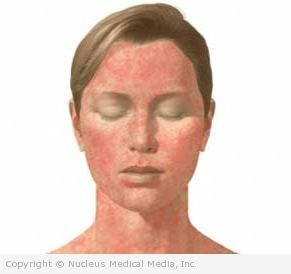Measles – Definition
Measles is viral infection. It is highly contagious. It causes fever, cough, and a rash. It was once a common childhood illness. Measles is now seen less often in the US. This is due to the use of the measles vaccine. But, there have been outbreaks in recent years.
Measles – Causes
The measles virus is spread by:
- Direct contact with nasal or throat secretions of infected people
- Airborne transmission (less frequently)
Measles is communicable from:
- 1-2 days before onset of symptoms
- 3-5 days before the rash
- Four days after the appearance of the rash
Measles – Risk Factors
These factors increase your chance of developing measles:
- Unvaccinated or inadequately vaccinated
- Living in crowded and/or unsanitary conditions
- Traveling to less developed countries where measles is common
- Season: winter and spring
- Immunosuppressed state (eg, untreated HIV), even if vaccinated
- Born after 1956 and either:
- You have never been diagnosed with measles.
- You received a vaccine before 1968, and you have never been fully vaccinated since.
Tell your doctor is you have any of the risk factors.
Measles – Symptoms
Symptoms, which usually occur 8-12 days following exposure, include:
- Fever (often high)
- Runny nose
- Red eyes
- Hacking cough
- Sore throat
- Exhaustion
- Very small spots inside the mouth (2-4 days after initial symptoms)
- Raised, itchy rash:
Starts around the ears, face, and side of neck 3-5 days after initial symptoms appear
Generally spreads to the arms, trunk, and legs over the next two days
Lasts about 4-6 daysFull recovery, without scarring, generally takes 7-10 days from the onset of the rash.
Measles – Diagnosis
The doctor will ask about your symptoms and medical history. A physical exam will be done. Diagnosis is made from the symptoms and the rash. Lab tests are usually not needed.
Measles – Treatment
Measles are caused by a virus. Therefore, it cannot be treated with antibiotics. The focus is on relieving symptoms.
Comfort Measures
- Gargle with warm salt water to relieve sore throat. Using a humidifier may also help.
- Treat high fever with non-aspirin medication. This includes acetaminophen. Cold sponge baths may also help.
- Note : Aspirin is not recommended for children or teens with a current or recent viral infection. This is because of the risk of Reye’s syndrome. Ask your doctor which other medicines are safe for your child.
- Get plenty of rest.
- Drink plenty of liquids.
- Eat a soft, bland diet.
Complications
In most cases, complications are rare. You may need to be hospitalized if you have a severe case. Complications may include:
- Encephalitis — inflammation of the brain
- Bacterial pneumonia — lung infection
If you are diagnosed with measles, follow your doctor’s instructions.
Measles – Prevention
Getting vaccinated is the best way to prevent measles. The vaccine contains live viruses that can no longer cause disease. There is a single vaccine to prevent measles, and it is also available in combination with:
- Mumps and rubella vaccine (MMR)
- Mumps, rubella, and varicella (chicken pox) vaccine (MMRV)
The regular schedule for giving the vaccine is at age 12-15 months and again at age 4-6 years. If you or your child has never been vaccinated against the measles, talk to the doctor.
In some cases, the MMR vaccine is given within three days after exposure. This can prevent or reduce symptoms. Immune globulin is given to certain unvaccinated people within six days of exposure. This is usually for infants and pregnant women.
If you or someone in your family gets measles, family members may need to be vaccinated or given immune globulin.
Ask your doctor if the vaccine is right for you. In general, avoid the vaccine if you:
- Have had severe allergic reactions to vaccines or vaccine components
- Are pregnant — Avoid pregnancy for 1-3 months after receiving the vaccine.
- Have a weakened immune system
- Have a high fever or severe upper respiratory tract infection
If you are not vaccinated, avoid contact with someone who has measles. Recent outbreaks of measles have occurred in Europe and the US. They may have been caused by increasing numbers of children who are not vaccinated. Discuss the benefits of vaccination with your doctor.

